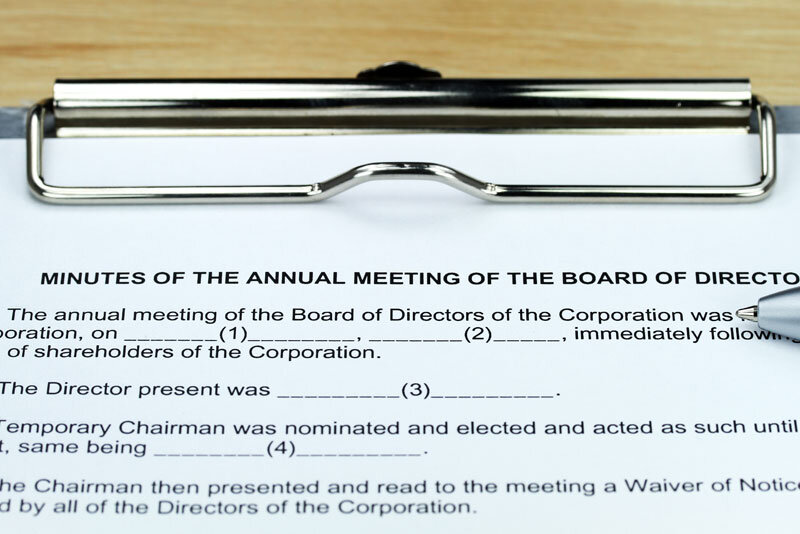Depending on a business’s entity type and the state it’s registered in, its owners may be required to hold annual meetings and record minutes from those meetings. But how do you know if that requirement applies to your company?
In this article, I’m going to explain what annual meetings and annual meeting minutes are to help you get on the path to determining if you must fulfill those important business compliance tasks. If you’re a professional services provider that coaches or gives direction to business owners, this information may be helpful to your clients, so feel free to share this post with them, too.
Annual Meetings
If a business is set up as a C Corporation or Limited Liability Company (LLC), it may need to hold an annual meeting with its owners. Naturally, these “annual” meetings with corporate shareholders or LLC members must occur every year.
Corporate and LLC annual meetings provide an opportunity for owners to discuss and vote on important company issues. Topics might include the business’s goals, the election of new board members, sales results, financial situation, and proposed changes to governance documents (such as corporate bylaws or an LLC’s operating agreement). Whether a company must hold annual meetings varies by state and business structure.
Note that if a business has elected S Corporation status for tax purposes, it must abide by its state’s annual meeting requirement for the underlying entity type. For example, an LLC that has elected to be taxed as an S Corporation must fulfill the state’s annual meeting requirements for limited liability companies. Likewise, a C Corporation that is taxed as an S Corporation must follow the state’s annual meeting rules for C Corporations.
Annual Meeting Minutes
Meeting minutes are a written record of what occurred at the annual meeting. They include names of who attended, what attendees talked about, voting results and decisions made, and actions taken. The rules for recording and handling annual meeting minutes vary from state to state.
Corporation Meeting Minutes
In most states, the government requires companies registered as a C Corporation to hold annual shareholders’ meetings and record minutes. Usually, a corporation’s bylaws set forth rules for how meetings are conducted—for example, how notice will be given (although states sometimes have basic requirements for this), the order of business during meetings, and the quorum (minimum number of shareholders present) required to hold a vote.
Some of the information a corporation’s annual meeting minutes might include are:
- Date, time, and location of the meeting
- Who recorded the minutes (typically, the corporate secretary)
- Names of who was in attendance
- Meeting agenda and a brief description of each item
- Details about what was discussed during the meeting
- Results of voting actions
- The time the meeting adjourned
After annual meeting minutes have been approved (per the company’s bylaws), the original executed copy should be kept in a safe place along with other corporate records (e.g., the articles of incorporation, bylaws, and resolutions).
There may be times when a corporation might also hold special shareholders’ meetings. For example, it may hold a meeting to get the approval of a merger, conversion, or other significant actions undertaken by its board of directors. In addition, corporations must hold the board of directors meetings (generally, at least once every year) to discuss strategic planning and make decisions, such as taking on new debt, issuing stock, declaring dividends, and more.
LLC Meeting Minutes
Most states don’t require LLCs to hold annual meetings and record minutes. However, if an LLC’s operating agreement requires annual meetings and recording of minutes, then the company must do so. It’s a matter of business compliance to demonstrate that the owners are adhering to the rules for maintaining the company as a legal business entity. That adherence helps to keep intact the corporate veil that protects LLC members’ personal assets from the company’s legal liabilities.
Items often found in LLC annual meeting minutes include:
- Date, time, and location of the meeting
- Name and title of the person who wrote the minutes
- The names of individuals in attendance
- Brief description of meeting agenda items
- Details about what the attendees discussed
- Decisions made and voting actions taken
- The time the meeting adjourned
All persons who have attended an LLC annual meeting should have an opportunity to review and request changes to the minutes before they are made an official part of the company’s records.
Many experts advise keeping minutes for a minimum of seven years. However, maintaining them as part of the business’s permanent record is ideal. If LLC members or corporate stakeholders (officers, directors, shareholders) make a reasonable request to review minutes from past meetings, the company should make them available to them.
What If You’ve Fallen Behind?
LLC and corporation owners who are required to hold an annual meeting and record minutes but haven’t yet should act soon if they want to check it off their compliance list before the end of their business’s fiscal year. Fortunately, CorpNet provides a template for annual meeting minutes that saves time by providing a basic format to follow.
Or if you’d prefer the done for you approach, the CorpNet team can draft the annual meeting minutes for you.
Annual meetings (and minutes) are essential requirements for keeping a business entity in good standing with the state and maintaining its protective corporate veil. Because of the potential legal implications of business compliance, consider talking with an attorney if you are unsure of your responsibilities or fear that you have fallen behind in your obligations. Also, remember you can rely on CorpNet for assistance with a wide range of LLC and corporate filings in all 50 states.
Contact us for more information about how we can help your stay business compliant year after year.





